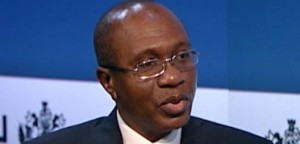So, if it is really about macroeconomic stability, why dress it up in the language of anti-corruption? Could this be to impress someone or dress the problem up in the lingo of a new regime? Because if truly Mr. Emefiele wants to stem illicit fund flows, this might amount to attempting to use a sledge hammer to kill fly that has landed on a glass coffee table – you will definitely miss the fly and you are sure to hear the shattering of what everyone knows already to be fragile.
The Central Bank of Nigeria (CBN) on August 1, 2015 issued a press release, ostensibly on the renewed vigilance to prohibit illicit financial flows in the banking system, citing their concern for what the Global Financial Integrity (GFI) report estimates to be US$15.7 billion lost annually from Nigeria in illicit funds. In the release, the CBN through the Director of Corporate Communications, Mr. Ibrahim Mu’azu, stated that Nigerian banks have started to curtail the acceptance of foreign currency cash deposits. This has been met with both praise and criticism as the naira in the parallel market went from N245 to the US Dollar to about N225 in a day or so leaving laymen with hopes of a more drastic fall should the policy be sustained. The critics suggest a devaluation of the naira is inevitable and that this will help exports and a restructuring of the economy in the end. Since he assumed the role of Central Bank Governor, Mr. Emefiele’s policies have had the economy moving in directions that leave a number of experts undecided – is this more to our credit or is this bad for the economy?
One of the main agenda items set by Mr. Emefiele for his time in office is to ensure macroeconomic stability, which means at least buffering against currency and interest rate fluctuations. He said his leadership would look to gradually reduce interest rates and maintain exchange rate stability. What achievements have been evident in the last 14 months? Has the naira exchange rate stabilised? Has the purchasing power of the naira itself been protected? Does it cost more to purchase the same basket of goods today as compared to last year? Simply put, has Mr. Emefiele performed this last 14 months he has been in office?
Mr. Ernest Odior, an Economics lecturer at the University of Lagos points out that the CBN under Emefiele’s watch has not managed macroeconomic issues satisfactorily. According to him, “Macro economy has two major issues connected to it, which include the gross domestic product, GDP, and inflation.” In contrast, Mr. Titus Okurounmu a former director at the CBN argues that it will be unfair to blame Emefiele for the current inflation level in the country given that controlling the global price of crude oil is beyond him. Mr. Okurounmu’s explanation however points to the genesis of the problem quite well. In looking at exchange rate stability, economists highlight six main factors that influence the exchange rate. They are: interest rate, inflation rate, trade balance, political stability, the general state of the economy and the quality of governance. A Central Bank’s responsibility is to oversee the monetary system of a nation. The CBN through policy is really only able to affect the interest rate and inflation rate – although he did try his hand at trade policy too (with the list of items banned for forex access). But in reality our trade balance and the last three factors have more to do with fiscal policy, which are outside the CBN’s direct influence.
Some experts suggest that perhaps Mr. Emefiele may have exhausted the options he can imagine to achieve macroeconomic stability and has now shut down everything as a last ditch effort to get the exchange rates down. If true, although providing a short term shift, this might prove just as unsustainable as using our foreign reserves to shore up the naira against the dollar which was the preference of some of those who were there before him – besides, this is no longer an option since we are now cash strapped as a nation. So, if it is really about macroeconomic stability, why dress it up in the language of anti-corruption? Could this be to impress someone or dress the problem up in the lingo of a new regime? Because if truly Mr. Emefiele wants to stem illicit fund flows, this might amount to attempting to use a sledge hammer to kill fly that has landed on a glass coffee table – you will definitely miss the fly and you are sure to hear the shattering of what everyone knows already to be fragile.
Missing the fly. The Thabo Mbeki High Level Panel report on illicit financial flows in Africa notes that IFFs from commercial activities (defined as IFFs from tax evasion/avoidance and trade misinvoicing – over invoicing of exports and under invoicing of imports) amount to some 65 percent, while IFFs from criminal activities and corruption are 30 percent and five percent respectively. This is particularly telling because it implies curtailing the acceptance of foreign currency cash deposits by commercial banks will not curb IFFs beyond perhaps some of the proceeds of crime and corruption. The bulk, 65 percent of IFFs, said to be from normal commercial activities, then goes through the banking system largely undetected and policies to adequately address the issue have not been put in place yet under Mr. Emefiele.
Shattering the fragile. Our economy is right now as fragile as that proverbial glass coffee table. The banks moved acting almost as one, to curtail foreign currency deposits even before the CBN publicly released its statement. Who is/are the ultimate beneficiaries of this move? Is it really “orders from above”, “orders from within” or are we witnessing “orders from the side”? You decide.
PREMIUM TIMES
END


Be the first to comment